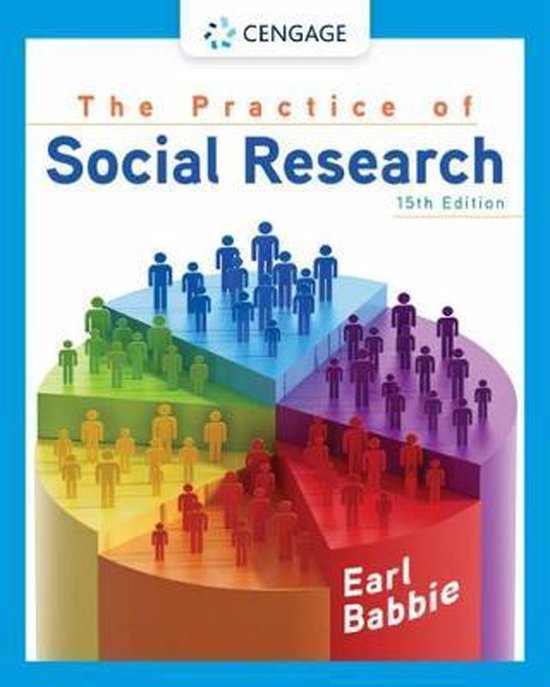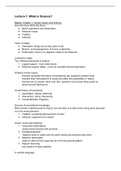Lecture 1: What is Science?
Babbie, Chapter 1: Human Inquiry and Science.
How We Know What We Know
● Direct experience and observation
● Personal inquiry
● Tradition
● Authority
Views of reality
● Premodern: things are as they seem to be.
● Modern: acknowledgement of human subjectivity.
● Postmodern: there is no objective reality to be observed.
Looking for reality
Two criteria/components of science
1. Logical support - must make sense.
2. Empirical support (data) - must not contradict actual observation.
Ordinary human inquiry
- Humans recognize that future circumstances are caused by present ones.
- Humans learn that patterns of cause and effect are probabilistic in nature.
- Humans aim to answer ‘what’ and ‘why’ questions and pursue these goals by
observing and figuring out.
A brief history of humankind
1. Association: seeing, observing
2. Intervention; doing, intervening
3. Counterfactuals; imagining
Sources of secondhand knowledge
Both provide a starting point for inquiry, but can lead us to start at the wrong point and push
us in the wrong direction.
1. Tradition: accepting what everyone ‘knows’.
2. Authority: judgment of an expert.
Inquiry: errors and solutions
1. Inaccurate observations
measurement devices add precision.
2. Overgeneralization
repeat a study to make sure the same results are produced each time.
3. Selective observation
make an effort to find cases that do not fit the general pattern.
4. Illogical reasoning
use systems of logic explicitly.
A variable language
, - Variable = a logical set of attributes, categories or values. Examples are gender,
age, social class, education level.
- Attribute = a characteristic. Examples are female, 18, middle class, primary school.
Dependent & independent variables
- Dependent variables (DV) = determined or caused by something; depends on
something else.
- Independent variables (IV) = no dependence; they are what they are.
- Hypothesis = expected relation between variables; between variable X
(=independent, ‘’cause’’) and variable Y (dependent, ‘’effect’’).
Example:
IV: Gender DV: Income
IV: Education DV: Racial prejudice
IV: Job father DV: Education son
Foundations of social science
- Theory - logic. Systematic explanation of an aspect of life.
- Data collection - observation.
- Data analysis - the comparison of what is logically expected with what is actually
observed; combination of logic and observation.
Approaches to social research
- Idiographic: seeks to fully understand the causes of what happened in a single
instance (case) by using a lot of variables that are specific for that single case.
- Nomothetic: seeks to explain a class of situations or events rather than a single one
(generalizability) by using only a few variables.
- Induction: from specific observations to the discovery of a pattern among all the
given events.
- Deduction: from a pattern that might be logically expected to observations that test
whether pattern occurs.
The wheel of science: you don’t have to start with theory, you can start wherever you want.
STARTING WITH theory
- Max Weber, The protestant ethic and the spirit of capitalism
, - Revolution theory
STARTING WITH empirical generalisations
- Emile Durkheim, Suicide
Explaining suicide on the basis of existing statistics.
- Generalisation 1: people that are alone commit suicide more than people that are
married.
- Generalisation 2: people that are living in cities commit suicide more than people
living in villages.
- Generalisation 3: protestants commit suicide more than catholics.
- Theory: lack of social cohesion explains suicide.
STARTING WITH hypotheses
- Contact hypothesis (Allport, 1954): ethnic diversity of a classroom increases trust and
cooperation between ethnic groups within a classroom.
- Conflict hypothesis: ethnic diversity of a classroom decreases trust and cooperation
between ethnic groups within a classroom.
- Constrict hypothesis (Putnam, 2007): ethnic diversity of a classroom decreases the
trust and cooperation within an ethnic group and between ethnic groups within a
classroom.
STARTING WITH observations
Anything you experience that you find interesting.
Approaches to social research
- Qualitative data: non numerical data.
- Quantitative data: numerical data. Makes observations more explicit and makes it
easier to aggregate, compare and summarize data.
- Pure research (AKA basic or fundamental research) - sometimes justified in terms of
gaining ‘’knowledge for knowledge’s sake.’’
- Applied research: putting research into practice, for instance evaluation research or
policy research.
Babbie, Chapter 12: Evaluation research.
Topics of evaluation research
● Need assessments.
Determine existence and extent of problems.
● Cost-benefit studies.
Whether results of a programme can be justified by its expense.
● Monitoring studies.
Provide steady flow of information about a topic of interest (for instance Rotterdam
Social Index).
● Programme evaluations/Outcome assessment
Whether a social intervention has the intended result.
Classic evaluation design (pretest posttest control group design in afbeelding)
➢ Experiments (or randomised control trials).
➢ Pretest & posttest.
, ➢ Experimental & control groups.
➢ Random selection of subjects, random assignment of people to the groups.
➢ Policy is about programmes & outcomes.
➢ Science is about causes & effects.
➢ Evaluation of policy should be done with classic experiments, because they can test
the cause-effect relationships.
➢ So programmes are seen as causes, and outcomes are seen as effects.
Quasi-experimental designs
● Time-series design.
OOOOOXOOOOO
● Nonequivalent control groups.
OXO
O-O
● Qualitative designs.
● Social indicators.
● Computer simulations.
Evaluation is about measuring effects.
Evaluation is about defining problems.
Evaluation is about using results.
Evaluation is about testing theories; realistic evaluation; starting with programme theory.
Lecture 2: Philosophy of Science.
Babbie, Chapter 2: Paradigms, Theory and Social Research.
Attributes of a variable can be categories (male, female) or scores (IQ scores).
Babbie, Chapter 1: Human Inquiry and Science.
How We Know What We Know
● Direct experience and observation
● Personal inquiry
● Tradition
● Authority
Views of reality
● Premodern: things are as they seem to be.
● Modern: acknowledgement of human subjectivity.
● Postmodern: there is no objective reality to be observed.
Looking for reality
Two criteria/components of science
1. Logical support - must make sense.
2. Empirical support (data) - must not contradict actual observation.
Ordinary human inquiry
- Humans recognize that future circumstances are caused by present ones.
- Humans learn that patterns of cause and effect are probabilistic in nature.
- Humans aim to answer ‘what’ and ‘why’ questions and pursue these goals by
observing and figuring out.
A brief history of humankind
1. Association: seeing, observing
2. Intervention; doing, intervening
3. Counterfactuals; imagining
Sources of secondhand knowledge
Both provide a starting point for inquiry, but can lead us to start at the wrong point and push
us in the wrong direction.
1. Tradition: accepting what everyone ‘knows’.
2. Authority: judgment of an expert.
Inquiry: errors and solutions
1. Inaccurate observations
measurement devices add precision.
2. Overgeneralization
repeat a study to make sure the same results are produced each time.
3. Selective observation
make an effort to find cases that do not fit the general pattern.
4. Illogical reasoning
use systems of logic explicitly.
A variable language
, - Variable = a logical set of attributes, categories or values. Examples are gender,
age, social class, education level.
- Attribute = a characteristic. Examples are female, 18, middle class, primary school.
Dependent & independent variables
- Dependent variables (DV) = determined or caused by something; depends on
something else.
- Independent variables (IV) = no dependence; they are what they are.
- Hypothesis = expected relation between variables; between variable X
(=independent, ‘’cause’’) and variable Y (dependent, ‘’effect’’).
Example:
IV: Gender DV: Income
IV: Education DV: Racial prejudice
IV: Job father DV: Education son
Foundations of social science
- Theory - logic. Systematic explanation of an aspect of life.
- Data collection - observation.
- Data analysis - the comparison of what is logically expected with what is actually
observed; combination of logic and observation.
Approaches to social research
- Idiographic: seeks to fully understand the causes of what happened in a single
instance (case) by using a lot of variables that are specific for that single case.
- Nomothetic: seeks to explain a class of situations or events rather than a single one
(generalizability) by using only a few variables.
- Induction: from specific observations to the discovery of a pattern among all the
given events.
- Deduction: from a pattern that might be logically expected to observations that test
whether pattern occurs.
The wheel of science: you don’t have to start with theory, you can start wherever you want.
STARTING WITH theory
- Max Weber, The protestant ethic and the spirit of capitalism
, - Revolution theory
STARTING WITH empirical generalisations
- Emile Durkheim, Suicide
Explaining suicide on the basis of existing statistics.
- Generalisation 1: people that are alone commit suicide more than people that are
married.
- Generalisation 2: people that are living in cities commit suicide more than people
living in villages.
- Generalisation 3: protestants commit suicide more than catholics.
- Theory: lack of social cohesion explains suicide.
STARTING WITH hypotheses
- Contact hypothesis (Allport, 1954): ethnic diversity of a classroom increases trust and
cooperation between ethnic groups within a classroom.
- Conflict hypothesis: ethnic diversity of a classroom decreases trust and cooperation
between ethnic groups within a classroom.
- Constrict hypothesis (Putnam, 2007): ethnic diversity of a classroom decreases the
trust and cooperation within an ethnic group and between ethnic groups within a
classroom.
STARTING WITH observations
Anything you experience that you find interesting.
Approaches to social research
- Qualitative data: non numerical data.
- Quantitative data: numerical data. Makes observations more explicit and makes it
easier to aggregate, compare and summarize data.
- Pure research (AKA basic or fundamental research) - sometimes justified in terms of
gaining ‘’knowledge for knowledge’s sake.’’
- Applied research: putting research into practice, for instance evaluation research or
policy research.
Babbie, Chapter 12: Evaluation research.
Topics of evaluation research
● Need assessments.
Determine existence and extent of problems.
● Cost-benefit studies.
Whether results of a programme can be justified by its expense.
● Monitoring studies.
Provide steady flow of information about a topic of interest (for instance Rotterdam
Social Index).
● Programme evaluations/Outcome assessment
Whether a social intervention has the intended result.
Classic evaluation design (pretest posttest control group design in afbeelding)
➢ Experiments (or randomised control trials).
➢ Pretest & posttest.
, ➢ Experimental & control groups.
➢ Random selection of subjects, random assignment of people to the groups.
➢ Policy is about programmes & outcomes.
➢ Science is about causes & effects.
➢ Evaluation of policy should be done with classic experiments, because they can test
the cause-effect relationships.
➢ So programmes are seen as causes, and outcomes are seen as effects.
Quasi-experimental designs
● Time-series design.
OOOOOXOOOOO
● Nonequivalent control groups.
OXO
O-O
● Qualitative designs.
● Social indicators.
● Computer simulations.
Evaluation is about measuring effects.
Evaluation is about defining problems.
Evaluation is about using results.
Evaluation is about testing theories; realistic evaluation; starting with programme theory.
Lecture 2: Philosophy of Science.
Babbie, Chapter 2: Paradigms, Theory and Social Research.
Attributes of a variable can be categories (male, female) or scores (IQ scores).




